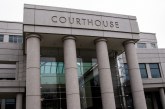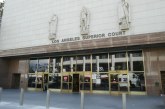 Tuesday saw the beginning of the actual trial phase of the Gang Injunction Trial in which Yolo County Superior Court Judge Kathleen White will determine whether to issue a permanent injunction. The key issue is whether the Broderick Boys are in fact a criminal street gang that poses a nuisance to a specific geographic area in West Sacramento known as the safety zone.
Tuesday saw the beginning of the actual trial phase of the Gang Injunction Trial in which Yolo County Superior Court Judge Kathleen White will determine whether to issue a permanent injunction. The key issue is whether the Broderick Boys are in fact a criminal street gang that poses a nuisance to a specific geographic area in West Sacramento known as the safety zone.
The burden will be on Ryan Couzens and Jay Linden, Deputy District Attorneys in Yolo County to prove this case. They are opposed by many different attorneys that we will get to know over the course the next few months that will see dozens of witnesses on both sides.
Finally, the Vanguard is also covering the trial this week of Rudy Ornelas in another courtroom. However, he is a defendant in the Gang Injunction case. He is represented pro per, meaning he is his own witness, however, he is not present for this trial and in custody. Judge White was not comfortable with allowing him to unrepresented, and therefore ordered his case severed from the rest and it will be determined if he can be partially included in this trial when he becomes available.
Plaintiff’s Opening Statement
Mr. Linden argued that the Broderick Boys Gang exists, that they are part of the Norteno gang and that their members engage in criminal street crime activities. They have common signs, symbols and colors. They have specific tattoos such as XIV denoting the number 14, they may have dots with a “one” and a “Four”, they wear red, some have a “B” in a circle. Furthermore they will base their evidence on convictions and statements to the police.
He made the analogy that they will rely on expert testimony. Mr. Linden said that if you are going to determine that the highway is dangerous, you do not rely on the people who travel on there a few times on occasion, but rather the experts who evaluate safety conditions using technical expertise and scientific evaluations. Therefore they will rely on law enforcement and other professionals rather than non-expert community members who may only see a few things to make their case.
Mr. Linden further argued that they will be looking at criminal and non-criminal actions by the alleged gang members to show a nuisance to West Sacramento. He argued that in the Acuna decision that they ruled that the prosecution does not necessarily have to show that crimes were committed in furtherance of a criminal street gang as defined by California Penal Code 186.22 in order to show that a nuisance exists.
Co-Plaintiff Counsel Ryan Couzens quoted from the second paragraph of California Penal Code Section 186.21:
“The Legislature, however, further finds that the State of California is in a state of crisis which has been caused by violent street gangs whose members threaten, terrorize, and commit a multitude of crimes against the peaceful citizens of their neighborhoods. These activities, both individually and collectively, present a clear and present danger to public order and safety and are not constitutionally protected. The Legislature finds that there are nearly 600 criminal street gangs operating in California, and that the number of gang-related murders is increasing. The Legislature also finds that in Los Angeles County alone there were 328 gang-related murders in 1986, and that gang homicides in 1987 have increased 80 percent over 1986. It is the intent of the Legislature in enacting this chapter to seek the eradication of criminal activity by street gangs by focusing upon patterns of criminal gang activity and upon the organized nature of street gangs, which together, are the chief source of terror created by street gangs. The Legislature further finds that an effective means of punishing and deterring the criminal activities of street gangs is through forfeiture of the profits, proceeds, and instrumentalities acquired, accumulated, or used by street gangs.”
He argued that the evidence will show a reasonable effort to combat a nuisance which is narrowly tailored in a time, place, and manner specifically impacting individuals. He believes the court can craft a safety zone and reasonable gang injunction that balances the rights of the residents against the need to protect against a dangerous criminal street gang.
Defendant’s Opening Statement
He further cited that their expert Daniel Vasquez will testify that there are prison gangs in West Sacramento but not criminal street gang, the Broderick Boys. Instead, Broderick Boy or Broderick Girl are a term of identification in a specification neighborhood rather than the designation or membership in a criminal street gang.
Second, he questioned the usefulness of self-identified admissions of gang membership. As we would see with the first witness on Tuesday, the prosecution often insists on admitting to a gang enhancement as a condition of the plea bargain. This forces people to identify themselves as members who are not and never were members of a gang. They only do so under pressure from prosecution.
Third, they need to show that the individual is in fact a member of a gang. The individual defendants will deny membership and it will be the burden of the plaintiffs to prove it.
Fourth, it is not merely enough to show that they are a member of the gang, but in fact they need to show that they are engaged in a pattern of crimes as defined by California Penal Code 186.22, those crimes “committed for the benefit of, at the direction of, or in association with any criminal street gang, with the specific intent to promote, further, or assist in any criminal conduct by gang members.” He argued that most of the crimes that the plaintiffs will site do not fit the definition of a gang crime as defined by PC 186.22.
Fifth, they have to show a present nuisance and he argued that there is no present nuisance in or near the safety zone. They will show this through the testimony of community members who will cover every street in the Broderick and Bryte Communities.
He argued that there is no nuisance in the safety zone except by the West Sacramento Police Department itself. He argued that residents do not fear the criminal street gangs so much as the police department itself. Many of the defendants no longer live in West Sacramento.
The gang enhancement process itself is flawed and there would be sufficient evidence to show everyone in the courtroom is a member of criminal street gang using those criteria.
Wazhma Mojaddidi read into the record the first paragraph from Penal Code 186.21 which recognizes the constitutional rights of even those who are accused gang members:
“The Legislature hereby finds and declares that it is the right of every person, regardless of race, color, creed, religion, national origin, gender, age, sexual orientation, or handicap, to be secure and protected from fear, intimidation, and physical harm caused by the activities of violent groups and individuals. It is not the intent of this chapter to interfere with the exercise of the constitutionally protected rights of freedom of expression and association. The Legislature hereby recognizes the constitutional right of every citizen to harbor and express beliefs on any lawful subject whatsoever, to lawfully associate with others who share similar beliefs, to petition lawfully constituted authority for a redress of perceived grievances, and to participate in the electoral process.”
Gordon Kaupp added that while DDA Couzens suggested that the remedy to the alleged nuisance that the Broderick Boys supposedly threaten the community with was reasonable and measured, he argued that in fact it is extraordinary and the measure of last resort. He argued that the plaintiffs had the burden of showing that no other possible remedy exists under the law.
The plaintiffs planned to call Angel Sanchez on Tuesday but the court will determine if he can take the stand on Friday as we previously mentioned. Also they called the first witness, Thomas Cedillo. We will have the full story on that tomorrow. It was a curious choice as he has a single plea arrangement criminal conviction from 2003, and has a wife, family, and steady job with a very limited criminal history and no evidence of gang activity since.
—David M. Greenwald reporting





[i]”Gang Injunction Trial Opens with Opening Statements and the First Live Witness.”[/i]
The Dead Witnesses have all finished testifying?
” Mr. Linden said that if you are going to determine that the highway is dangerous, you do not rely on the people who travel on there a few times on occasion, but rather the experts who evaluate safety conditions using technical expertise and scientific evaluations. “
Why not rely on the people who travel that highway everyday? Why doesn’t the prosecutor ask the people who live in the neighborhood if there is a problem? Instead he is going to rely on experts. Experts are people who are hired by prosecutors and say exactly what they are paid to say. David keep up the good work. You are finally showing the people of this county that this is a legal system that has nothing to do with JUSTICE!
“The Dead Witnesses have all finished testifying?”
As opposed to declarations either in writing or during depositions.